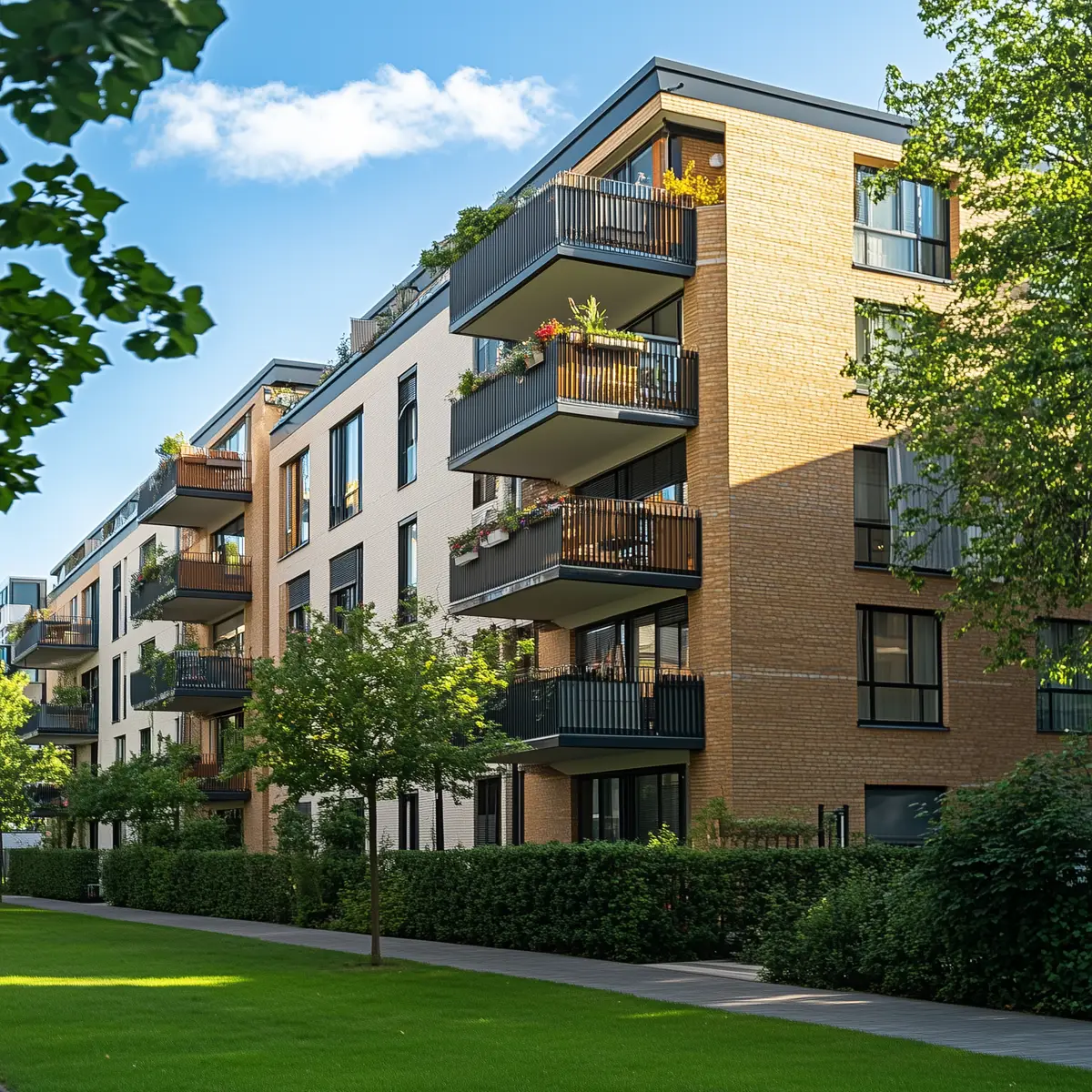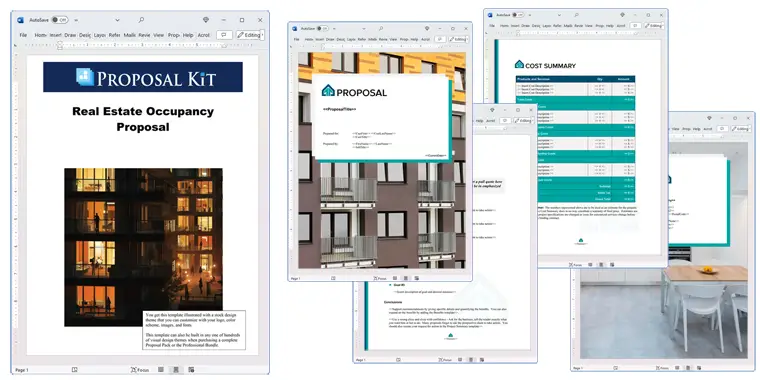How to write your Real Estate Occupancy Proposal
We include this 17 page layout with every Proposal Pack. If you want this template to have a different visual design theme than the one illustrated here, purchase any Proposal Pack design and create this template using the purchased design theme. This template is included in every Proposal Pack. If you get a Proposal Pack or the Professional, you can also make any variation of this template with different chapters to suit your needs.
We typically include more chapters in the templates than most people will need to give everyone more variety in the chapters they may need. You can trim down a long template by removing pages you do not need or combining multiple chapter topics into one page.
 DOWNLOADABLE, ONE-TIME COST, NO SUBSCRIPTION FEES
DOWNLOADABLE, ONE-TIME COST, NO SUBSCRIPTION FEES![]() View Real Estate Occupancy Sample Proposal
View Real Estate Occupancy Sample Proposal
This sample proposal is based on the same layout as this template and is included in every Proposal Pack. The visual design of the templates will match whichever Proposal Pack design you purchase. To get this template in a different design theme than shown in the sample, purchase any other Proposal Pack design theme and this template will be included.
You can create an editable Word version of this sample in any design theme of your choice including branded to your logo.
You can also create countless variations of this document to suit your needs using the included library of 2200+ chapters if ordering a Proposal Pack or Professional.
 What Our Clients Say
What Our Clients SayThis product is a businessperson’s savior. If you have to do a proposal for any business venture, this product makes it effortless. There are lots of templates to choose from; the downloading process is smooth and streamlined; and very importantly, [they are] available for any questions you might have. I love it!"
CEO, Edgar J. Ridley & Associates
Related Article
Related Video
Related Templates
- Real Estate Conversion of Apartments to Condos Proposal
- Commercial Property Rental Proposal
- Real Estate Agency Services Proposal
- Real Estate Resort Development Sales Proposal
- HOA Property Management Proposal
- Real Estate Investment Prospectus Proposal
- Non-Smoking Property Management Proposal
- Property Management Services Proposal
- Commercial Real Estate Broker Proposal
- Real Estate Multi-Building Investment Proposal
- Commercial Office Real Estate Lease Proposal
- Commercial Property Sales Proposal
- Real Estate Investment Funding Proposal
- Real Estate Property Sales Services Proposal
- Real Estate Agency Listings Proposal
- Commercial Lease Proposal Template
- Commercial Real Estate Proposal Template
- Real Estate Flipping Investment Proposal
- Lease Agreement Proposal Template
- Business Lease Proposal Template
What's the best way to write your real estate occupancy proposal?
Proposal Kit is a proven solution for creating a proposal to enhance real estate occupancy and retention. This software package and template library guide you through creating an occupancy proposal and integrating a line item quoting database system. This feature ensures detailed cost summaries, quotes, estimates, budgets, and other financial topics are effortlessly covered.
If you need to write such a proposal, the Proposal Kit is designed for you.
What Types of Projects Are Real Estate Occupancy Proposals Written For?
Occupancy proposals are written for projects to improve community engagement and retention rates. Here are some examples of situations where these proposals are written:
- Community wellness program launch
- Resident retention strategy development
- Community rebranding initiatives
- Property management improvement plans
- Tenant satisfaction surveys implementation
- Occupancy rate enhancement strategies
- Infrastructure improvement projects
- New amenities introduction
- Green building certifications
- Safety and security upgrades
- Cultural and recreational activities planning
- Affordable housing initiatives
- Renovation and refurbishment projects
- Community outreach programs
- Technology integration for smart buildings
- Public space enhancements
- Partnership with local businesses
- Energy efficiency projects
- Accessibility improvements
- Tenant communication systems updates
Chapters this template is built with
No one-size-fits-all premade template fits every situation; however, Proposal Kit software allows you to create customized proposals to match any situation. Using its extensive content library, you can create a proposal tailored to your specific needs. Below is a list of chapter templates from the library you can use, highlighting how each can be used in your proposal:
Cover Letter
The cover letter serves as an engaging introduction to your real estate proposal. It should communicate your enthusiasm for the project and provide a snapshot of what the reader can expect. Considering the situation of improving occupancy, it might mention your intent to boost resident satisfaction through new amenities or community programs, setting a positive and professional tone from the outset.
Executive Summary
The executive summary should encapsulate your project's core objectives and anticipated results. For an occupancy proposal, this section would summarize the proposed initiatives, such as improving communal spaces or offering new resident services, and how these will lead to higher retention and occupancy rates. By capturing the essence of your proposal here, you quickly convey the value to decision-makers.
SWOT Analysis
A SWOT analysis in your proposal provides an overview by identifying strengths, weaknesses, opportunities, and threats related to occupancy. For instance, you might highlight the strength of having a dedicated property management team, acknowledge the weakness of outdated amenities, explore opportunities like community events to attract residents, and consider threats such as nearby competitive developments.
Needs Assessment
The needs assessment is an important part of your proposal. It involves investigating the specific challenges the community or property faces. By detailing issues such as high turnover rates or a lack of modern facilities, you justify the need for your proposed solutions. This section helps stakeholders understand the pressing needs that your project aims to address.
Competitive Analysis
A competitive analysis helps position your proposal by evaluating the strengths and weaknesses of competing properties. This could include assessing nearby apartments with similar features but lower resident engagement. Understanding these dynamics allows you to pinpoint unique topics of your proposal, such as superior customer service or exclusive community events, which can set your property apart.
Market and Audience
Defining the market and audience involves pinpointing the demographics and preferences of current and potential residents. This section of your proposal might identify young professionals or families as primary targets and align your initiatives, like coworking spaces or family-friendly events, to their needs, thus making the proposal more compelling to stakeholders.
Implementation Plan
In the implementation plan, you outline the steps to bring your proposal from concept to reality. An occupancy proposal could include a timeline for upgrading facilities, launching marketing campaigns, and rolling out new resident programs. You demonstrate your capability and readiness to execute the project by detailing each phase with expected resources and timelines.
Marketing Plan
The marketing plan section should propose methods to promote your property's enhanced features and benefits. Ideas might include digital marketing campaigns targeting specific demographics, partnerships with local businesses for resident discounts, or hosting open house events. This ensures your initiatives reach and resonate with potential residents, increasing occupancy.
Community
Highlighting community benefits is vital for gaining buy-in from stakeholders. This section could discuss how proposed projects, such as a new fitness center or community garden, foster a sense of belonging and encourage long-term residency. Demonstrating how your project enhances the community's quality of life can significantly boost the proposal's attractiveness.
Occupancy
The occupancy section directly addresses how the initiatives will improve occupancy rates. It should connect topics of the proposal, like customer service enhancements or facility upgrades, to expected increases in resident retention and attraction rates. This clarity helps stakeholders visualize the project's impact on occupancy.
Cost/Benefit Analysis
A detailed cost/benefit analysis reassures stakeholders of the proposal's financial viability. In a real estate occupancy context, this might involve comparing the costs of implementing new amenities against the expected increase in rental income and decreased vacancy rates. This analysis provides a clear picture of the project's return on investment.
Qualifications
Showcasing qualifications involves presenting your team's expertise and track record in improving occupancy and resident satisfaction. Highlighting past successful projects, certifications, and experiences builds credibility and assures stakeholders of your ability to deliver on the proposal's promises.
Future Developments
Discussing future developments provides a forward-looking perspective on your project. You might outline potential expansions or additional amenities that could be introduced as occupancy rates improve, assuring stakeholders that your proposal isn't just a one-time initiative but part of a plan for ongoing enhancement.
Mission Statement
A strong mission statement aligns your proposal with the community's or management's overarching goals and values. This section should succinctly articulate the vision behind your project, such as creating a vibrant, inclusive living environment, thus fostering a deeper connection with stakeholders who share similar values.
Use cases for this template
Revitalizing Green Spaces for Community Engagement
The Challenge
Lily, a manager at Green Spaces Inc., faced a challenge. The community had a beautiful park that was vastly underused, contributing to low community engagement and plummeting occupancy rates in the surrounding residential areas. The park's potential was untapped, and Lily needed to persuade the local council to invest in an ambitious eco-friendly revitalization project. The challenge was presenting a case highlighting the social and environmental benefits of transforming the park into a vibrant community hub.
The Solution
To tackle this challenge, Lily turned to the Proposal Kit. This resource provided her with templates centered around community wellness and sustainability, allowing her to create a proposal that thoroughly addressed the community's needs. With these tools, she highlighted the potential for increased community activities and environmental benefits, painting a picture of a greener, more inviting park.
The Implementation
Using the Proposal Kit, Lily customized her proposal. She incorporated detailed illustrations and statistics to project the positive impact on local real estate occupancy. Her proposal outlined a phased approach to the park's transformation, emphasizing topics like new walking trails, community gardens, and eco-friendly playgrounds. This structured vision, supported by Proposal Kit's resources, made her proposal robust and persuasive.
The Outcome
The well-structured and comprehensive proposal captivated the council. The promise of increased community interaction and improved occupancy rates tipped the scales in favor of Green Spaces Inc. The collaboration was approved, leading to a remarkable transformation of the park. Over time, the community experienced a surge in engagement, and local occupancy rates improved, fulfilling Lily's goal.
Racing Against Time to Deliver Tenant Satisfaction
The Challenge
Ben, an analyst at Urban Developments LLC, was handed an important task: writing a proposal to overhaul the tenant satisfaction framework. The deadline was tight, and the stakes were high, as the board was eager to implement changes to improve tenant retention. Ben needed an efficient solution that would allow him to produce a high-quality proposal without compromising on detail and comprehensiveness.
The Solution
Ben relied on Proposal Kit's comprehensive template library, supplemented by an AI writing tool, to navigate this challenge. This enabled him to generate insightful content by synthesizing existing company data. The AI tool analyzed and summarized relevant information from Urban Developments' resources, providing Ben with a solid foundation for his proposal.
The Implementation
Through the Proposal Kit, Ben tailored his proposal, ensuring it addressed all critical topics of tenant satisfaction. The AI-assisted insights allowed him to include data-driven recommendations and predictive analytics, creating a narrative outlining the proposed program's benefits. His approach was systematic, ensuring that each section flowed logically and concisely.
The Outcome
The board was impressed by the clarity and depth of Ben's proposal, which was delivered well within the tight deadline. The proposal's insights and thorough analysis led to the program's approval and implementation. As a result, Urban Developments LLC witnessed a notable improvement in tenant satisfaction and retention rates, validating Ben's efforts and the effectiveness of the Proposal Kit.
Creating a Vision for Community Revitalization
The Challenge
Sarah, the director at Community First Foundation, faced an ambitious project: issuing a Request for Proposals (RFP) for a community revitalization initiative. The goal was to attract partners who shared the foundation's commitment to uplifting local living standards. Creating an RFP that communicated the foundation's vision and requirements was critical to ensuring the success of this initiative.
The Solution
Sarah used Proposal Kit's structured templates to write a clear and compelling RFP. The templates helped her organize the document efficiently, including all necessary details and expectations. Using the Proposal Kit, she could articulate the foundation's overarching goals and the specific outcomes they hoped to achieve.
The Implementation
Sarah methodically incorporated the templates into her RFP, detailing the project's objectives, scope, and evaluation criteria. She emphasized the importance of innovative solutions and collaboration. The well-written RFP served as a comprehensive invitation to potential partners, outlining how they could contribute to the revitalization goals and what benefits they might expect in return.
The Outcome
The RFP generated significant interest and attracted a diverse range of proposals. This allowed Community First Foundation to select a partner who aligned with its mission and brought innovative ideas and sustainable solutions. The ensuing partnership marked a successful step in the community's revitalization efforts, enhancing local living standards and fulfilling the foundation's vision.
Conclusions and Recommendations
Proposal Kit offers a robust solution, providing a comprehensive library of templates tailored to meet diverse needs. From enhancing community engagement to improving resident retention, Proposal Kit ensures your proposal is persuasive. Whether you're a service provider, an employee on a tight deadline, or a non-profit director, Proposal Kit simplifies the proposal process, helping you succeed.
Also Known As
This template may also be referred to in different ways or be used in more specialized situations, such as:
- Residential Retention Proposal
- Property Occupancy Plan
- Tenant Engagement Proposal
- Community Retention Strategy
- Real Estate Improvement Proposal
- Occupancy Enhancement Proposal
- Resident Experience Plan
- Housing Occupancy Proposal
- Community Wellness Proposal
- Tenant Satisfaction Proposal
Abstract
 Creating a real estate occupancy proposal requires a thoughtful approach to enhance property value and engagement. This document serves property owners, real estate agents, and potential buyers by outlining the factors and situations impacting unit occupation and potential profitability. A well-structured proposal details property specifics, evaluates purchase prices, and suggests revenue streams through optimized rental rates and occupancy rates. By conducting thorough research and analysis, the project team can determine crucial topics affecting property health, such as location and community engagement initiatives.
Creating a real estate occupancy proposal requires a thoughtful approach to enhance property value and engagement. This document serves property owners, real estate agents, and potential buyers by outlining the factors and situations impacting unit occupation and potential profitability. A well-structured proposal details property specifics, evaluates purchase prices, and suggests revenue streams through optimized rental rates and occupancy rates. By conducting thorough research and analysis, the project team can determine crucial topics affecting property health, such as location and community engagement initiatives.
The occupancy proposal focuses on boosting resident satisfaction and retention, with initiatives ranging from infrastructure improvement to technology integration and community rebranding. By explaining the benefits of new amenities and upgrades, the proposal establishes a roadmap to improve occupancy rates and increase revenue. Additionally, it addresses potential disputes, taxes, and transaction topics, preparing stakeholders for a successful agreement.
Critical sections of the proposal include an executive summary, SWOT analysis, and cost/benefit analysis to paint a clear picture of the property's future. Proposal Kit facilitates this process with its extensive library of customizable templates and automated line-item quoting, streamlining the proposal creation to meet the desired outcome within a limited period. By preparing a detailed implementation and marketing plan, the proposal illustrates the project's readiness to assigned dates and schedules, ultimately aiming to notify stakeholders of its impactful vision and attract recognized prospects.
 A well-written real estate proposal template is an invaluable tool for streamlining the process of increasing occupancy rates and enhancing property appeal. Such a proposal covers property details, ensuring that every topic, from the number of units occupied to the configuration of individual rooms, is addressed. This comprehensive approach supports property owners and real estate agents in delivering a vision that stands out in the competitive market.
A well-written real estate proposal template is an invaluable tool for streamlining the process of increasing occupancy rates and enhancing property appeal. Such a proposal covers property details, ensuring that every topic, from the number of units occupied to the configuration of individual rooms, is addressed. This comprehensive approach supports property owners and real estate agents in delivering a vision that stands out in the competitive market.
The use of Proposal Kit in creating these documents offers significant advantages. Its extensive knowledge base and template library empower users to produce professional proposals without unnecessary delays. By using automated quoting systems and customizable templates, real estate professionals can efficiently prepare proposals, showcasing their expertise and attention to detail. This preparation not only facilitates a smoother transaction process but also reassures stakeholders of the project's viability.
In an office setting, these proposals serve as a vital contact point between buyers, sellers, and agents, ensuring all parties are well-informed and aligned with the property's goals. By integrating insights and data, the proposal illustrates potential revenue increases and highlights how targeted improvements can maximize the units' value. In regards to enhancing community engagement and satisfaction, these proposals pave the way for successful partnerships and long-term occupancy, ultimately benefiting the entire neighborhood.
 To further streamline the creation of real estate occupancy proposals, being well-prepared with a systematic approach is important. Using Proposal Kit allows property owners and real estate agents to efficiently organize their ideas, ensuring that each proposal is comprehensive and tailored to the specific needs of the project. This preparedness minimizes the time spent on writing and revisions, allowing more focus on planning and execution.
To further streamline the creation of real estate occupancy proposals, being well-prepared with a systematic approach is important. Using Proposal Kit allows property owners and real estate agents to efficiently organize their ideas, ensuring that each proposal is comprehensive and tailored to the specific needs of the project. This preparedness minimizes the time spent on writing and revisions, allowing more focus on planning and execution.
Incorporating a streamlined method not only speeds up the proposal development process but also enhances its effectiveness in communicating the value propositions to potential investors and stakeholders. By presenting well-researched data and clearly defined objectives, these proposals become powerful instruments in showcasing the property's potential and the anticipated benefits of increased occupancy. The ability to quickly adjust to market changes and integrate up-to-date information ensures that the proposals remain relevant and compelling, ultimately leading to successful negotiations and project outcomes.
Frequently Asked Questions
How do I begin writing an occupancy proposal?
To start writing an occupancy proposal, it's essential to understand your project's objectives and the community's or property's specific needs. Conduct a thorough needs assessment to identify the challenges and opportunities the proposal will address. With these insights, you can structure your proposal using the customizable templates Proposal Kit offers. These templates guide you in organizing your thoughts and ensuring all critical components, such as goals, benefits, and strategies, are presented.
What should be included in an occupancy proposal?
A comprehensive occupancy proposal should include several key sections to cover all necessary topics. Begin with an executive summary that outlines the proposal's main points and anticipated outcomes. Next, incorporate a SWOT analysis to overview your project's strengths, weaknesses, opportunities, and threats. Detailed sections such as the needs assessment, implementation plan, and cost/benefit analysis are also vital, as they offer a deeper understanding of the project's feasibility and potential impact on occupancy rates.
How can Proposal Kit assist with the financial components of my occupancy proposal?
Proposal Kit is equipped with a line item quoting database system that simplifies the management of financial components in your occupancy proposal. This feature lets you quickly generate detailed cost summaries, quotes, estimates, and budgets, ensuring that all financial topics are represented. Using this tool, you can present a clear and credible financial plan supporting your proposal's objectives and appealing to stakeholders and decision-makers.
What sets Proposal Kit apart from other proposal writing tools for an occupancy proposal?
Proposal Kit distinguishes itself from other proposal writing tools through its extensive library of customizable templates for diverse projects, including occupancy proposals. Unlike generic one-size-fits-all solutions, Proposal Kit provides tailored templates that can be adapted to fit the unique requirements of your proposal. This flexibility ensures you can address all critical topics and present your project compellingly, enhancing your chances of winning bids and securing contracts.
Can I use the Proposal Kit for other business proposals beyond occupancy projects?
Proposal Kit's versatility extends beyond occupancy proposals to various business proposal types. Its comprehensive library includes thousands of templates covering multiple industries and project needs. Whether you're working on a marketing campaign, technology integration, community wellness program, or any other business initiative, Proposal Kit offers the tools necessary to create a professional and persuasive proposal, helping you achieve your business goals.
20% Off Discount
![]() Add To Cart This Word Template
Add To Cart This Word Template
 Add To Cart Proposal Pack Real Estate #8
Add To Cart Proposal Pack Real Estate #8
 Add To Cart Proposal Kit Professional
Add To Cart Proposal Kit Professional
 4.7 stars, based on 849 reviews
4.7 stars, based on 849 reviewsProposal Kit chapters used in this template
Cover Letter, Title Page, Table of Contents, Executive Summary, SWOT Analysis, Occupancy, Needs Assessment, Competitive Analysis, Community, Market and Audience, Implementation Plan, Marketing Plan, Cost/Benefit Analysis, Qualifications, Future Developments, Mission Statement, Back Page
Line Item Automated Chapters
If you purchase a Proposal Pack or the Professional Bundle, these proposal pages are generated using an automated line-item database in the included Wizard software.
Implementation Plan, Cost Benefit Analysis
You use this proposal for
- General business proposal
- Non-technical proposal
- Service sales proposal
- Project pitch proposal
- Construction, contracting, building proposal
- Medical, healthcare, wellness proposal
- Real estate, property proposal
- Spiritual, church, community proposal
How to create this template with Proposal Pack Wizard
You can create this document using any of the logo-designed Proposal Packs. Pick any Proposal Pack with a logo design theme you like best; they will all work equally well. The Proposal Pack for Any Business is the pack with no extra added logos or colors - designed to be used plain or for you to customize with your logos and graphics.
The Proposal Pack design theme you purchase will determine the visual look of this template. The screenshot above only shows the plain generic design theme.
We include a library of chapters to be assembled based on your needs. All proposals are different and have different needs and goals. We designed Proposal Pack so you can customize the documents to suit your needs.
You will best create this document using the Proposal Pack Wizard - Expert Edition software to select this template and build it in the Proposal Pack logo design theme of your choice along with any desired customizations (such as adding additional chapters, removing unneeded chapters, changing the order of chapters, and importing your company logo). This template outlines a proposal for the described situation. Each user is responsible for typing in the actual content of the provided pages with their information to complete the proposal. Suggestions in the abstract may include features in higher-end packages and are facilitated by the selection of chapter templates to support the narrative of each proposal, which help guide the user in filling in the details.
The Wizard software's AI Writer will write the content of the pages of the template based on details provided for your company, client, project, financial details and other writing instructions. This will provide a personalized version of the template completely written and ready to edit.
Once finished, the AI Writer's Word-to-PowerPoint converter can transform your proposal, business plan, or other business documents into a PowerPoint slideshow. Save time and effort by letting the AI analyze every chapter to condense its content into talking points, visually matching the document, and providing a consistent package of presentation material with the click of a button.
You create this template using the Wizard software with an entire Proposal Pack library and software. We include the Expert Edition of the software in the Proposal Kit Professional. Microsoft Word for Windows is required to use the customizing software. You can also edit Word document templates in other office software such as Word for Mac. We will assist Mac users in assembling complex templates for their first project if they do not have the required platform to run the Wizard software.
How to Build Templates Featured on Proposal Kit Website
Many people find the Proposal Kit website after searching for a specific proposal. Once you've purchased and installed the software, how do you build that template you found in the first place? This video shows you how to build any proposal you see on the Proposal Kit website.
 Ian Lauder has been helping businesses write their proposals and contracts for two decades. Ian is the owner and founder of Proposal Kit, one of the original sources of business proposal and contract software products started in 1997.
Ian Lauder has been helping businesses write their proposals and contracts for two decades. Ian is the owner and founder of Proposal Kit, one of the original sources of business proposal and contract software products started in 1997.By Ian Lauder
 Published by Proposal Kit, Inc.
Published by Proposal Kit, Inc.


 Cart
Cart
 Get 20% off ordering today:
Get 20% off ordering today: 


 Facebook
Facebook YouTube
YouTube Bluesky
Bluesky Search Site
Search Site